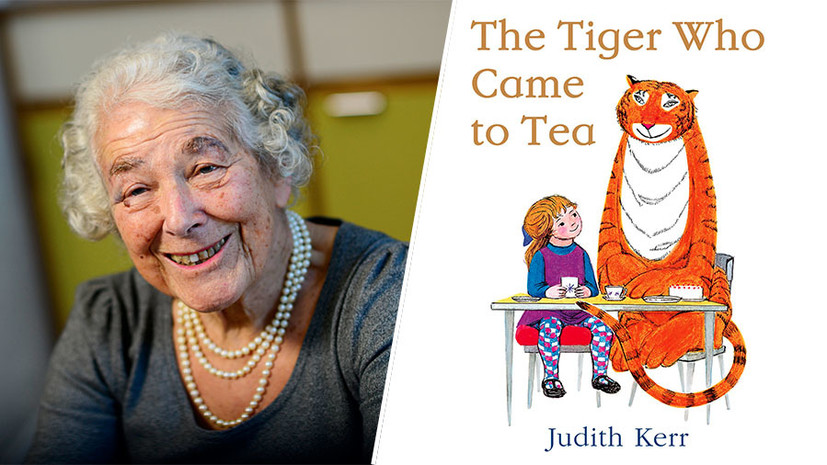Activist Rachel Adamson of Zero Tolerance, an anti-violence charity, said the popular book for children by British writer Judith Kerr, The Tiger Who Came to Drink Tea, reinforces gender inequality.
According to the activist, it ultimately leads to violence against girls and women.
According to the plot in the book, the girl and her mother sit down to drink tea. A hungry tiger comes to visit them and asks permission to join the tea party. Soon, the tiger eats all the food it can find in the house and drinks all the drinks and water. After that, the guest leaves. The hostess realizes that now she has nothing to feed her husband with. He, having learned about the incident, leads the family to a cafe, and the next morning the girl goes with her mother to the store. There they buy groceries, and also buy a can of tiger food in case the guest comes back. However, the tiger does not come to them anymore.
Rachel Adamson explained on BBC Radio Scotland what caused her displeasure.
According to the activist, the book presents an old-fashioned portrayal of women and family, as only a man in the end manages to save the situation by taking loved ones to a cafe.
Also, Adamson wonders why the tiger in this story is exactly male - he could be a female or gender-neutral character.
“We know that gender stereotypes are harmful and contribute to gender inequality, and gender inequality is the cause of types of violence against girls and women, such as domestic abuse, rape and sexual harassment,” says Rachel Adamson.
She stressed that the book is a reflection of society, so it should be considered in more detail.
“It must be admitted that these are not just stories.
I know this will upset many, but one such book is The Tiger Who Came to Drink Tea ... Judith Kerr is a wonderful writer, but this story tells about a society that should be looked at more closely, "says Rachel Adamson.
At the same time, the activist does not consider it necessary to ban the book.
In her opinion, the work can be used in kindergartens in conversations about the problem of violence.
Rachel Adamson's statement was commented on by Megan Gallagher, a spokeswoman for the Conservative Party of Scotland for Children and Youth.
She agreed that over time, attitudes towards certain works inevitably change, however, according to the politician, "parents will be puzzled by some statements" of the activist.
“We are trying to tell children about their favorite books of the past, and such expressions are completely unjustified.
This government-funded organization can change its mindset in other, better ways, ”Gallagher quoted the Daily Mail as saying.
Judith Kerr's book The Tiger Who Came to Drink Tea was published in 1968 and has sold over 5 million copies worldwide.
Many readers have tried to understand what the author really meant by telling this story.
Some drew parallels between the heroes of the book and the life of the writer herself, some were looking for political overtones.
Judith Kerr herself has always denied the presence of any hidden meaning in the book and argued that her tiger is just a tiger that was hungry and wanted tea.
"The Tiger Who Came to Drink Tea" is not the first piece that has been revised recently. In mid-August, Scottish writer Keith Clanchy announced her intention to rewrite her memoir, Some of My Students and What They Taught Me, after readers perceived it as racist. In particular, they were touched by expressions such as "chocolate-colored" skin and "almond-shaped" eyes, which the author used to describe pupils from different racial minorities. Clanchy was also accused of ailing.
In August 2020, it became known about the decision of Agatha Christie's grandson James Pritchard to republish the bestseller Ten Little Indians in France under a new title - There were ten of them.
The correction was also subjected to the text of the book - the word "black woman" decided to replace the "soldiers".
Previously, the work was renamed in the US and UK.
The work of Rudyard Kipling and Enid Blyton has been criticized for "racism" in the UK.
In Kipling's poem "The White Man's Burden", among other things, "imperialist views and the romanticization of colonialism" were discovered.
Also, some educational institutions of the United States excluded from the Roman Harper Lee "kill the casting" because of the use of Niger's words in it, and the author was accused of inciting an interethnic retail.
In addition, in June 2020, accusations of racism were made against the cult 1939 film Gone With the Wind.
Then the director and screenwriter John Ridley said that racial stereotypes that are inappropriate today are broadcast in the tape.
Now available on HBO Max, the film is complemented by materials that explain its cultural context.
Also criticized were some of the classic Disney cartoons - "Aristocratic Cats", "Aladdin", "Dumbo", "Lady and the Tramp", "Peter Pan".
Disney + has blocked access to paintings for children under the age of seven.
Other viewers can watch cartoons, but the video is accompanied by a warning about "mistaken stereotypes."

